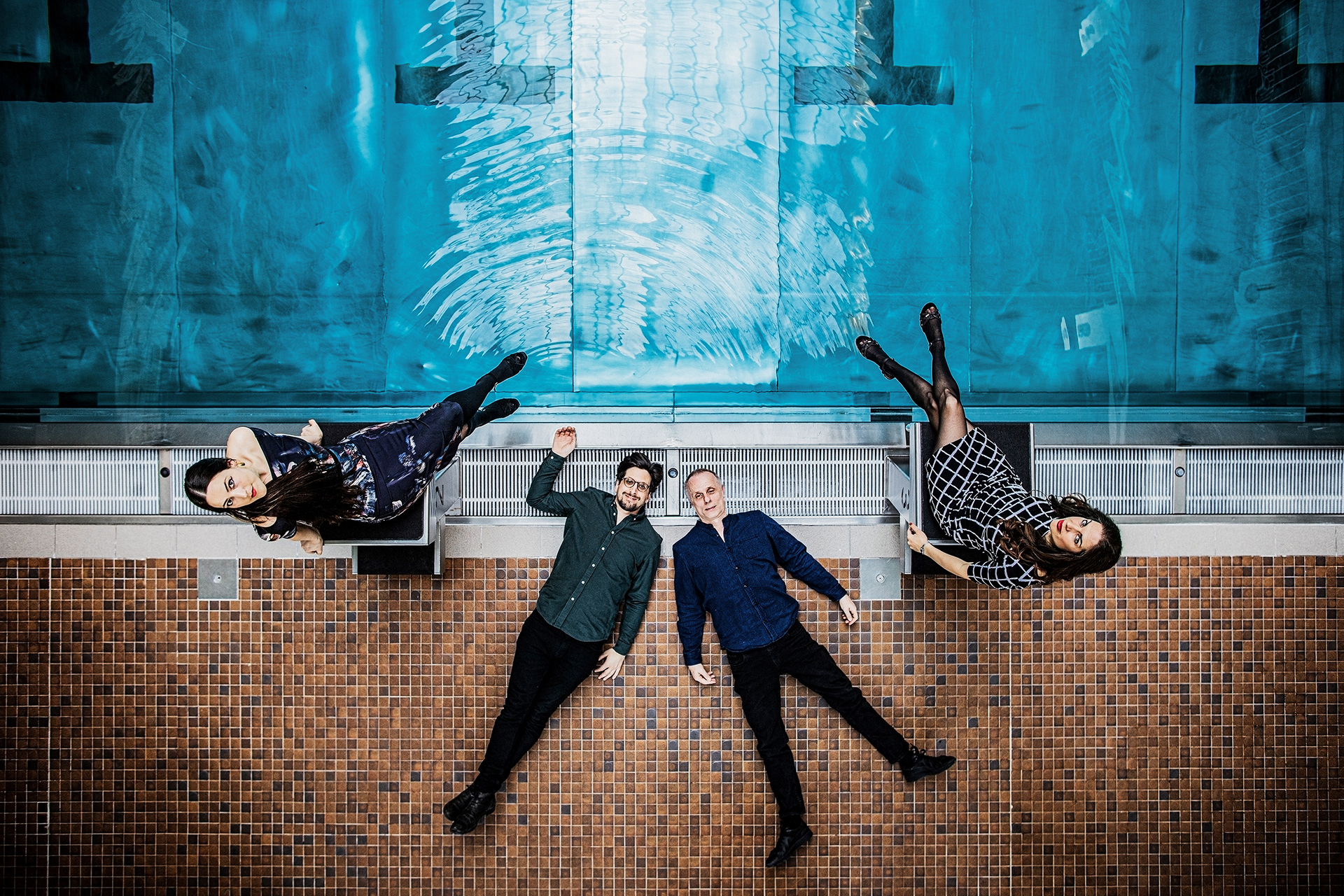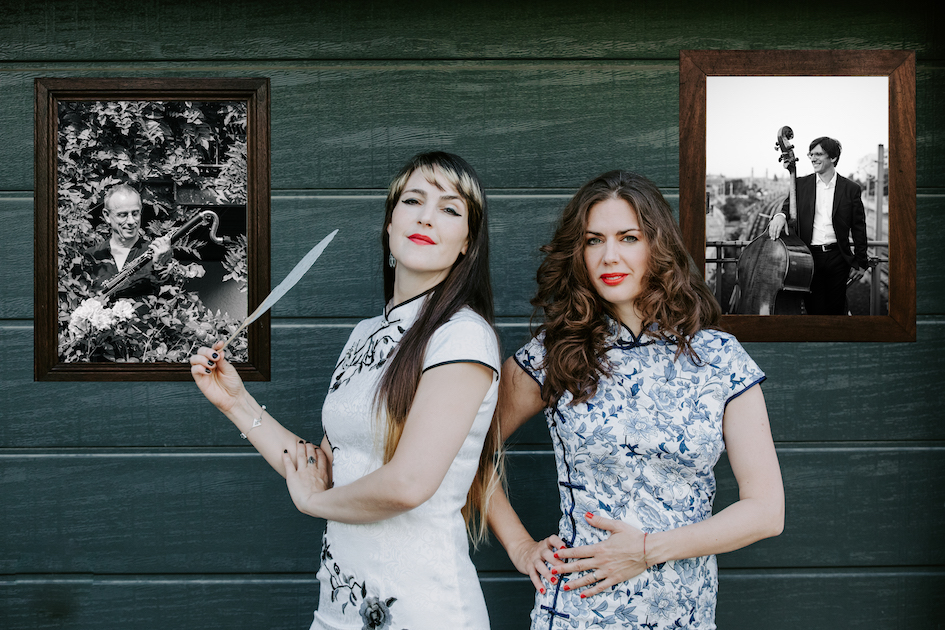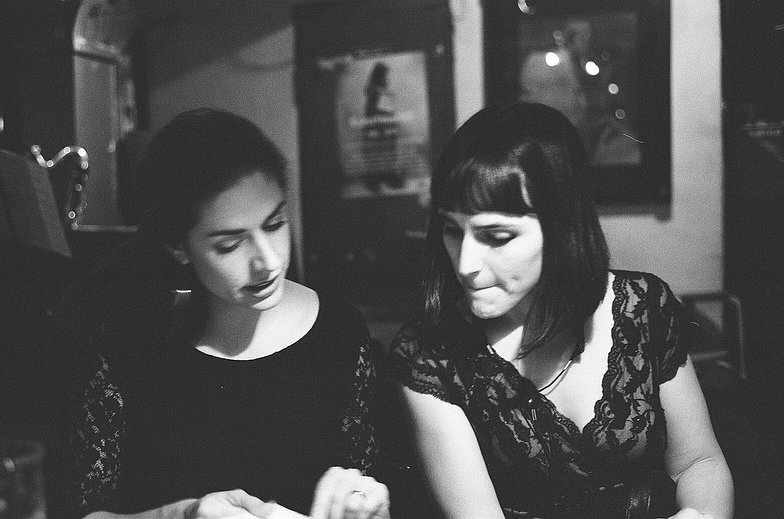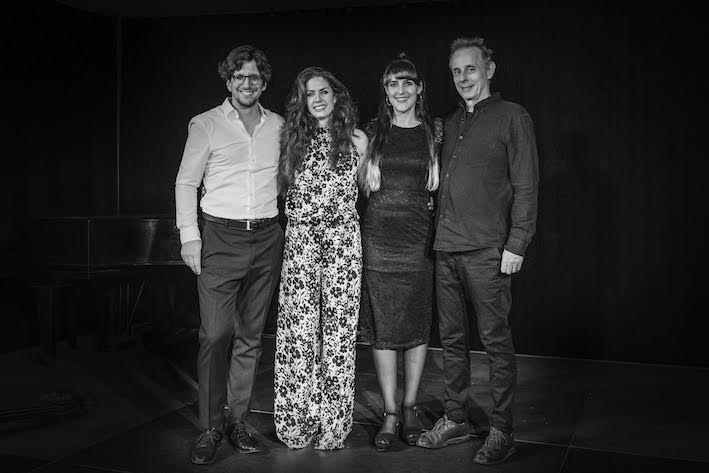Formed in 2009, jazz quartet AZOLIA has not only toured their previous two albums across Europe, but gained international recognition with their extraordinary line-up during two separate tours of southern China in 2014 and 2016, for which they received special invitations by the Gerneral Consulate of Chengdu and Canton.
AZOLIA consists of four unique musicians, each of whom has emerged onto the world jazz scene from an individual path involving meaningful collaborations with a variety of projects and ensembles.
Once the scope of its horrors began to take their toll, the First World War became known as “the war to end all wars.” More than a century later, that idealistic sobriquet has proved with distressing frequency to have been wishful thinking. On Not About Heroes, the haunting yet hopeful new album from the Berlin-based quartet Azolia, the words of WWI-era British poet Wilfred Owen are woven into rich tapestries of stark anti-war sentiment and urgent optimism.
Co-led by vocalist Sophie Tassignon and saxophonist/clarinetist Susanne Folk, Azolia features a unique line-up completed by renowned clarinetist/saxophonist Lothar Ohlmeier and bassist Andreas Waelti. Not About Heroes, due out January 29, 2021 via JazzWerkstatt Records, is the band’s third release, their first with a single unifying theme and adapting pre-existing lyrics. The music intricately twines Owen’s chronicles of the horrors of the battlefield with sinuous melodies and lyrical improvisations that make these words from generations past feel both elegantly timeless and viscerally immediate.
Owen wrote his poetry from first-hand experience. He was wounded in combat in 1917 and wrote many of his poems while recuperating, diagnosed with “shell shock” – what would today be termed PTSD. He returned to his regiment in the summer of 1918 and was killed in France a few months later. The majority of his poems were published posthumously, lending his already haunted lines the ghostly air of wisdom shared from beyond the grave.
Not About Heroes takes its title from the self-penned introduction to Owen’s 1920 collection Poems, which sets out a kind of mission statement for his work. “This book is not about heroes,” he writes. “English Poetry is not yet fit to speak of them… Yet these elegies are not to this generation, This is in no sense consolatory. They may be to the next. All the poet can do to-day is to warn.”
As Tassignon points out, Owen saw his role as that of a reporter, using his art to bring the reality of war more vividly to life. “His approach was being a journalist,” she says, “similar to the photographers that go into war zones today. He passionately believed that his poems would show the world in an aesthetic way that ultimately nobody benefits from war. We wanted to make our music touch the audience in the same way – hence the title of the album.”
Folk adds her hope that setting Owen’s words to music is a way to add their own contributions to the chorus of peaceful protest that bridges nations and generations. “Obviously I was never in war, so I can’t speak of it directly,” she admits. “But as an artist, you don’t want to close your eyes. Listening to this poet, we get a feeling for how terrible everything was. We thought we could put his ideas together with our own thoughts and maybe bring a little more peace into the world.”
Despite the tragedy of Owen’s experiences and the darkness of much of his work, it is hope for peace rather than dread of war that emerges from Azolia’s transcendently gorgeous and mesmerizing music. By placing these sentiments in such a profoundly moving and inventive context, Azolia celebrates the transformative power of the human imagination such that a world of possibilities open to the listener.
Ulrich Grunert, SVZ., 07.10.202
Once the scope of its horrors began to take their toll, the First World War became known as “the war to end all wars.” More than a century later, that idealistic sobriquet has proved with distressing frequency to have been wishful thinking. On Not About Heroes, the haunting yet hopeful new album from the Berlin-based quartet Azolia, the words of WWI-era British poet Wilfred Owen are woven into rich tapestries of stark anti-war sentiment and urgent optimism.
Co-led by vocalist Sophie Tassignon and saxophonist/clarinetist Susanne Folk, Azolia features a unique line-up completed by renowned clarinetist/saxophonist Lothar Ohlmeier and bassist Andreas Waelti. Not About Heroes, due out January 29, 2021 via JazzWerkstatt Records, is the band’s third release, their first with a single unifying theme and adapting pre-existing lyrics. The music intricately twines Owen’s chronicles of the horrors of the battlefield with sinuous melodies and lyrical improvisations that make these words from generations past feel both elegantly timeless and viscerally immediate.
Owen wrote his poetry from first-hand experience. He was wounded in combat in 1917 and wrote many of his poems while recuperating, diagnosed with “shell shock” – what would today be termed PTSD. He returned to his regiment in the summer of 1918 and was killed in France a few months later. The majority of his poems were published posthumously, lending his already haunted lines the ghostly air of wisdom shared from beyond the grave.
Not About Heroes takes its title from the self-penned introduction to Owen’s 1920 collection Poems, which sets out a kind of mission statement for his work. “This book is not about heroes,” he writes. “English Poetry is not yet fit to speak of them… Yet these elegies are not to this generation, This is in no sense consolatory. They may be to the next. All the poet can do to-day is to warn.”
As Tassignon points out, Owen saw his role as that of a reporter, using his art to bring the reality of war more vividly to life. “His approach was being a journalist,” she says, “similar to the photographers that go into war zones today. He passionately believed that his poems would show the world in an aesthetic way that ultimately nobody benefits from war. We wanted to make our music touch the audience in the same way – hence the title of the album.”
Folk adds her hope that setting Owen’s words to music is a way to add their own contributions to the chorus of peaceful protest that bridges nations and generations. “Obviously I was never in war, so I can’t speak of it directly,” she admits. “But as an artist, you don’t want to close your eyes. Listening to this poet, we get a feeling for how terrible everything was. We thought we could put his ideas together with our own thoughts and maybe bring a little more peace into the world.”
Despite the tragedy of Owen’s experiences and the darkness of much of his work, it is hope for peace rather than dread of war that emerges from Azolia’s transcendently gorgeous and mesmerizing music. By placing these sentiments in such a profoundly moving and inventive context, Azolia celebrates the transformative power of the human imagination such that a world of possibilities open to the listener
More
“a work of penetrating beauty” Geert Ryssen, Jazz & Mo’
“One of the two most interesting Jazz records of 2017 from the Berlin melting pot…” Andreas Felber, Radio Ö1
“…All pieces by this unusual lineup are good songs in every way! The new CD impresses by its well developed songwriting and a refreshingly transparent lightness in the arrangements. By leaving out drums and especially the piano as a binding harmonic instrument, every voice is treated equally within the group and therefore has much space to contribute meaning. The players use these opportunities for soloistic excursions, harmonic tension and sophisticated interactions in most highly inspired ways…” Stefan Pieper, Jazzthetik
“No useless convulsion or abstraction here; these pieces, both written and improvised, are delightful all along creating an extended and long lasting program of incredible originality.” Dragonjazz.com, Pierre Dulieu
“A quartet with a promising future.” Hans-Joachim Maquet, Jazzpodium, 11/2015
“…Folk Tassignon (presents) a vast musical spectrum which shines through vocal elegance and instrumental brilliance.. Their interaction is magical…”
All my Music, Helmut Blecher
“…Folk Tassignon dedicate themselves to Jazz…, which they combine with Songwriting…, and in addition to that with chamber music. Throughout, “Dancing on the Rim” is pleasantly anachronistic and feisty. Because it truly is something new.”
Eurosaar
“Sophie Tassignon is a Belgian, Berlin-based singer. She has a tremendous voice, which allows unexpected incursions into the higher register and melodies that think out of the box. Her voice blends remarkably with the skillful saxophone and clarinet sound of her German partner Susanne Folk. The bass clarinet and double bass deepen the mystery of this beautiful album.”
L’avis du Soir, J.-C. V.
©Photos: Severin Koller, Kathleen Friedrichs, David Beecroft, Katrin Andrzejewski, Gabriele Brusche (Forum Gestaltung, Magdeburg)









